I stopped using dryer sheets a while ago when my children were born to reduce the chemical load and fragrance due to their asthma and allergies. Initially, I experimented with alternative dryer sheets that resembled the traditional ones I was used to.
These eco-friendly fabric softeners were biodegradable and better overall, but I then realized that there were still even more options available that didn’t require adding to my regular grocery list.
The purpose of dryer sheets to reduce static cling and soften fabrics made me delve deeper into finding alternatives that aligned with our family’s health goals.
What is the Purpose of a Dryer Sheet?

Commonly used for reducing static cling and softening fabrics during the drying cycle, dryer sheets incorporate chemicals and compounds that aid in lubricating fabric fibers, resulting in a smoother and more comfortable feel.
These sheets are adept at minimizing static electricity accumulation, which tends to cause clothes to adhere or stick together, a common occurrence during drying. Besides their primary functions, dryer sheets often feature fragrances that impart a fresh and clean scent to clothing.
Some people employ dryer sheets for purposes extending beyond laundry, such as repelling insects or refreshing various areas in the household, including shoe interiors and car interiors. Exploring eco-friendly fabric softeners, chemical-free alternatives, and sustainable laundry solutions presents a shift towards environmentally conscious and safe options for those seeking natural alternatives to traditional dryer sheets.
Environmental Impact of Dryer Sheets
Traditional dryer sheets, ubiquitous in many households, contribute significantly to environmental concerns due to their non-biodegradable nature and consequential impact on landfills. These sheets, predominantly composed of synthetic materials like polyester, pose a considerable challenge to our ecosystems as they do not readily break down.
The non-biodegradable composition of dryer sheets implies that once discarded, they persist in landfills for extended periods, taking hundreds of years to decompose fully. As a result, they contribute substantially to the growing volume of waste in landfills, further exacerbating environmental issues.
Moreover, the chemicals and compounds infused within these sheets, primarily aimed at fabric softening and static reduction, present additional ecological threats. When disposed of after use, these chemicals can leach into the soil and water systems, potentially leading to environmental contamination and adverse effects on flora, fauna, and aquatic life.
The collective impact of non-biodegradable dryer sheets extends beyond their usage phase, significantly contributing to environmental pollution and landfill overflow. To mitigate these adverse effects, exploring eco-friendly alternatives and sustainable laundry solutions becomes imperative in reducing our reliance on conventional dryer sheets and addressing their detrimental environmental footprint.
What are traditional dryer sheets made of?
Traditional dryer sheets predominantly consist of synthetic fibers like polyester, known for their durability but notorious for their non-biodegradable nature. These synthetic materials take an exceptionally long time, often hundreds of years to decompose once discarded in landfills. Moreover, these sheets are laced with a myriad of chemicals and compounds designed to impart fabric softening and static-reducing properties.
The combination of synthetic fibers and chemical coatings presents a substantial environmental concern, contributing significantly to landfill waste and environmental pollution. As we seek alternative solutions that align with sustainability and eco-friendliness, understanding the composition of traditional dryer sheets underscores the urgency to explore safer and greener options.
What chemicals are on a traditional dryer sheet?
The exact composition of dryer sheets can vary depending on the manufacturer and the specific product, but they typically contain a mixture of ingredients such as:
- Fabric softeners: These are chemicals that are designed to reduce static cling and make fabrics feel soft and smooth. Examples of fabric softeners include quaternary ammonium compounds and fatty acid esters.
- Fragrances: Many dryer sheets contain perfumes or other fragrances that are intended to leave clothes smelling fresh and clean.
- Antistatic agents: These are chemicals that help reduce static electricity, which can build up in clothes during the drying process.
- Emulsifiers: These are substances that help to disperse the other ingredients in the dryer sheet evenly throughout the fabric.
- Dyes: Some dryer sheets are colored to make them more visually appealing.
For our family, the most obvious component we were trying to avoid was the fragrance which would cause skin irritations and respiratory issues for our children, but we were also concerned with the poly-waste that we were throwing into landfill with every load of laundry we did since it was not a sustainable laundry solution for the environment.
Are there eco-friendly and non-toxic dryer sheets?
I have tested a bunch of natural laundry alternatives available on the market throughout the years. They are safe alternatives to dryer sheets and are typically made from natural materials and do not contain harmful chemicals or synthetic fragrances and are considered eco-friendly fabric softeners. Many are made from cellulose fibres which use wood pulp instead of polyester which is a more sustainable alternative to traditional dryer sheets. These eco-friendly dryer sheets do not contain any plastic fibres and are designed to be compostable or recyclable after use.
Do I need to use a dryer sheet to do my laundry?
No, you do not necessarily need to use a dryer sheet to do your laundry. While dryer sheets can provide benefits such as reducing static cling, softening fabrics, and adding a pleasant scent to clothes, there are sustainable laundry solutions and safe alternatives to dryer sheets available that can achieve similar results.
Although some of the links in this article are affiliate links, meaning we may earn a small commission for suggesting them, we have done our best to suggest only the best quality out there. As an Amazon Associate, I earn from qualifying purchases with the links provided in this article. In no way does this affect our description or review of their products.
8 Best Alternative Dryer Sheets for Fluffy Laundry
Alternative Dryer Sheet #1:
Chemical-free dryer sheets
If you really can’t give up your regular dryer sheet routine, the best alternative dryer sheets are plant-based, biodegradable, chemical-free, fragrance-free options like Seventh Generation, Meyers, or Biokleen. I started my journey to healthier laundry here and overall it worked very well. A few great companies are making a more eco-friendly and healthier alternative dryer sheet. Here are a few of the companies I’ve tried and recommended. There are also ways to homemade dryer sheet options.
Alternative Dryer Sheet#2:
Baking Soda

Baking soda, also known as sodium bicarbonate, is a natural and non-toxic alternative to traditional fabric softeners and dryer sheets. It can be used in the wash cycle of your washing machine to help soften clothes and reduce static. I find that it works very well, and it is a great chemical-free dryer sheet alternative option if you’ve run out of your regular sheets. Here are some benefits of using baking soda in your laundry:
- Softens clothes: Baking soda can help to break down detergent residue and mineral deposits, which can make clothes feel stiff and scratchy. Adding a half-cup of baking soda to your wash cycle can help to soften clothes, leaving them feeling comfortable against your skin.
- Reduces static: When clothes rub together in the dryer, they can create static electricity. Baking soda can help to neutralize static, reducing the amount of static clinging to your clothes.
- Neutralizes odors: Baking soda has natural deodorizing properties that can help to neutralize odors in your laundry. This can be especially helpful for eliminating stubborn odors from workout clothes or towels.
To use baking soda in your laundry, simply add a half-cup of baking soda to the wash cycle along with your regular detergent. You can also add a cup of white vinegar to the rinse cycle to help rinse away any excess baking soda and leave clothes feeling soft and fresh. Baking soda is an affordable, chemical-free, and eco-friendly option that can help to keep your clothes looking and feeling their best.
Alternative Dryer Sheet #3:
Reusable Dryer Sheets

Reusable dryer sheets, such as PurEcosheets, are an eco-friendly and cost-effective alternative to traditional disposable dryer sheets. Made of 99% polyester and 1% nylon, these dryer sheets are hypoallergenic and free from chemicals, perfumes, and dyes. They are safe for all types of skin, making them an ideal option for allergy and eczema sufferers, as well as infants.
One of the biggest benefits of reusable dryer sheets is their longevity. These sheets can be used for hundreds of loads, replacing the need for disposable dryer sheets and fabric softeners. Not only is this a more sustainable option, but it can also save you money in the long run.
PurEcosheets are also versatile and can be used on any fabric, even delicate materials. They do not leave any chemical residue on your clothes, making them safe for children’s fabrics, technical fabrics, and cloth diapers. While they do not soften clothes that well, they are effective at eliminating static electricity that builds up in the dryer.
To use reusable dryer sheets, simply toss one or two sheets into the dryer with your laundry. If you want extra softness, you can add a little vinegar to the wash cycle. It is important to note that if you have previously used disposable dryer sheets, you may need to clean the inside of your dryer to remove any buildup before using reusable dryer sheets.
Alternative Dryer Sheet #4:
Wool Dryer Balls
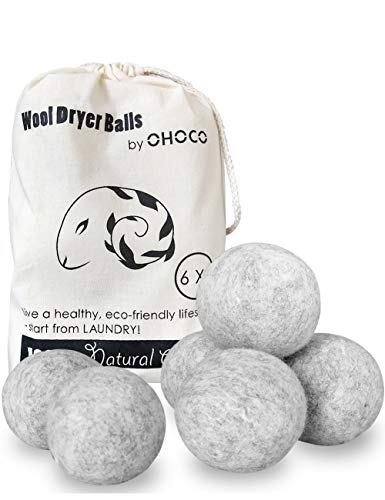
After many different options, I have finally ended up with 8 of these balls swishing around in my dryer as my alternative dryer sheet load after load. I don’t even have to think about it anymore except when they get stuck in a sleeve or wound up in a load of sheets.
Wool dryer balls are eco-friendly and effective alternative dryer sheets. Made from 100% natural wool, they can be reused many times, making them a cost-effective option for those looking to reduce their environmental impact.
When wool dryer balls are added to a dryer load, they work by absorbing moisture and circulating air. This helps to reduce drying time, which can save energy and money. The wool fibres also help to soften clothes and reduce static cling, which can eliminate the need for traditional dryer sheets or fabric softeners.
The science behind wool dryer balls is based on the principles of thermodynamics. The wool fibers absorb moisture from the clothes in the dryer, which helps to reduce drying time. As the dryer balls bounce around in the dryer, they create air pockets that allow for better air circulation, further reducing drying time. This increased air circulation also helps to reduce wrinkles and static cling in clothes.
If you’re looking to make your own dryer balls as an alternative dryer sheet with the wool you already have in your clothing donation pile check out this short and easy video: https://youtu.be/PTwyXx206Vo
Alternative Dryer Sheet #5:
Essential Oils on an Old Wool Sweater
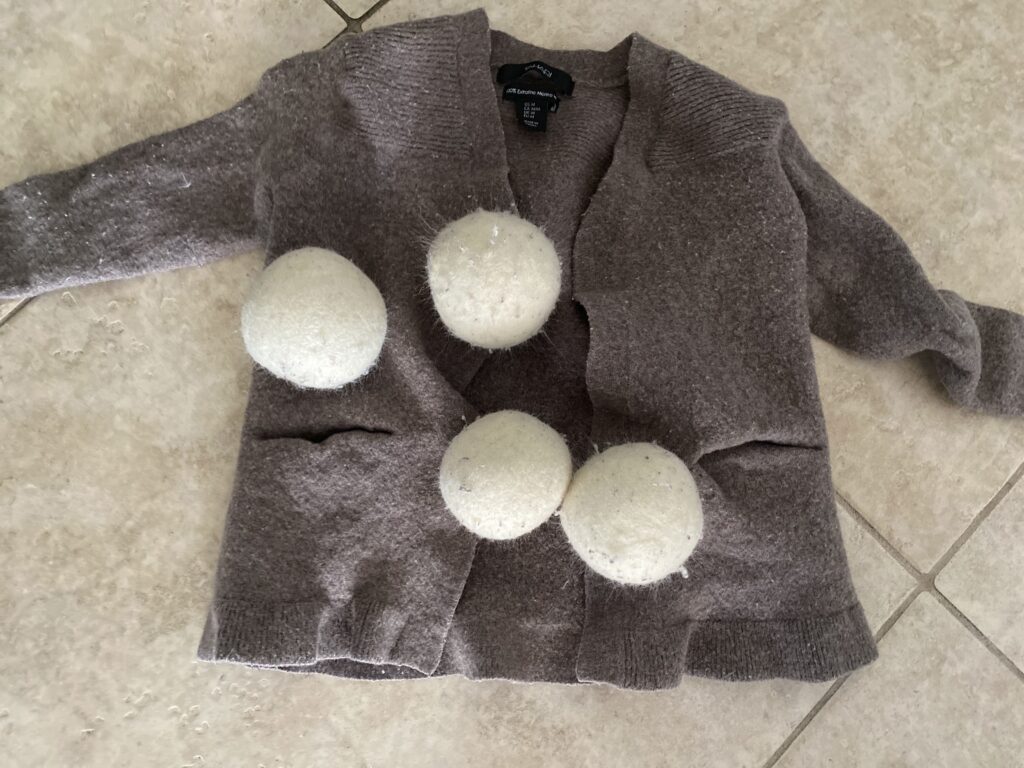
Adding a few drops of essential oils like lavender, lemon, or tea tree to wool dryer balls or an old shrunken wool sweater can add a fresh scent to your laundry. As you can see in the picture, I’ve reappropriated this shrunken old sweater as a dryer sheet. I can add any essential oil to the sweater giving the rest of the laundry a really nice and fresh smell. I use this option in combination with my wool dryer balls to make the laundry extra-fluffy. I recommend any essential oil from Saje, they make natural, non-toxic oil combinations that are AMAZING!!!
Alternative Dryer Sheet #6:
Air Drying
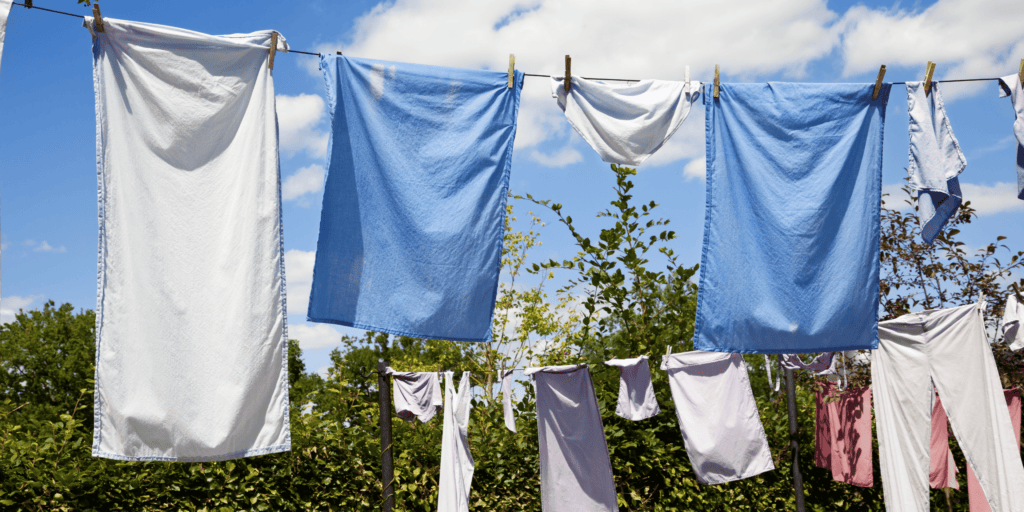
Air-drying is a simple and eco-friendly alternative to using a dryer. There are several benefits to air-drying clothes. First, it is more environmentally friendly than using a dryer. According to the Natural Resources Defense Council, dryers are one of the most energy-intensive appliances in the home, accounting for up to 6% of household energy use. By air-drying clothes, you can significantly reduce your energy consumption and carbon footprint.
Air drying does not directly replace a dryer sheet, as it does not provide the same benefits in terms of reducing static and fluffing clothing. However, there are some ways in which air drying can help to reduce static and maintain the fluffiness of clothing.
One way that air drying can reduce static is by preventing clothes from over-drying. When clothes are over-dried in a dryer, they can become staticky due to the friction between the fabric fibers.
To maintain the fluffiness of clothing when air-drying, you can give them a shake or fluff them up before hanging them to dry. This can help to separate the fibers and prevent them from clumping together, which can make clothes look flat or wrinkled.
Alternative Dryer Sheet #7:
Silicone Balls

Silicone balls can be a good alternative for dryer sheets. One of the benefits of silicone balls over wool dryer balls is that they are hypoallergenic and do not shed or produce lint. This can be especially beneficial for people with allergies or sensitivities to wool. Like wool dryer balls, silicone balls can help to reduce drying time and soften clothes without the use of chemical-laden dryer sheets.
Silicone balls work by creating space between the clothes in the dryer, which allows hot air to circulate more effectively and dry clothes more quickly. This can help to save energy and reduce your electricity bill. Additionally, the gentle tumbling action of the balls can help to soften clothes and reduce wrinkles without the need for fabric softeners or dryer sheets.
If you are looking for an eco-friendly and non-toxic alternative to dryer sheets, both silicone and wool dryer balls can be good options to consider. While they may not completely eliminate static cling, they can help to reduce it and provide other benefits like reducing drying time, softening clothes, and saving energy.
Alternative Dryer Sheet #8:
Vinegar

Most people will recommend adding vinegar to the rinse cycle of your washing machine, but I always found it difficult to time it out properly! Instead, I added vinegar to the fabric softener dispenser and it worked great! This way, you won’t have to stop the machine to add the vinegar manually. Be aware though, some washing machines may not have a separate dispenser for fabric softener and instead have a combined dispenser for detergent and fabric softener, in which case it may not be possible to add vinegar in this way.
Vinegar works by softening clothes, reducing static, and removing odors. This is because vinegar is slightly acidic, which can help to break down the minerals in hard water that can make clothes feel stiff and rough. As a result, clothes come out of the washer feeling softer and more comfortable to wear. Don’t worry about the smell, it dissipates quickly and you don’t even notice it!
It’s important to note that vinegar should never be mixed with bleach, as it can produce toxic fumes.
Additional Tips for Fresh Laundry
Maintaining fresh-smelling laundry without relying on traditional dryer sheets is achievable through natural alternatives and simple practices:
- Natural Scenting Methods: Add a few drops of essential oils (lavender, lemon, tea tree, etc.) onto a small cloth or dryer balls before placing them in the dryer. This provides a natural and refreshing aroma without relying on chemical-laden dryer sheets.
- Static Reduction Techniques: Sort fabrics effectively before washing, opt for lower heat settings during drying, and incorporate a quarter-cup of white vinegar in the rinse cycle. These simple strategies reduce static electricity in clothes, leaving them feeling soft and free from wrinkles.
Embrace these natural scenting methods and practical laundry hacks to maintain fresh, static-free, and neatly pressed laundry without traditional dryer sheets. These eco-conscious alternatives contribute to a more sustainable and toxin-free approach to laundry care.
Conclusion
In conclusion, there are several eco-friendly and non-toxic alternatives to dryer sheets that can help to soften clothes, reduce static, and eliminate odors. Wool dryer balls, vinegar, baking soda, and reusable dryer sheets are all effective options that can be used to replace traditional dryer sheets.
Additionally, air-drying your clothes is a great way to avoid using the dryer altogether and can also help to prolong the life of your clothing. By making the switch to these alternative dryer sheet methods, you can reduce your carbon footprint and enjoy fresher, softer, and more natural-smelling laundry without exposing yourself or your family to harmful chemicals. For information about non-toxic candles for allergies, take a look at our article here. Also, to learn more about some of the best eco-friendly items on Amazon, check out our list.
Give these alternatives a try and see the difference for yourself!

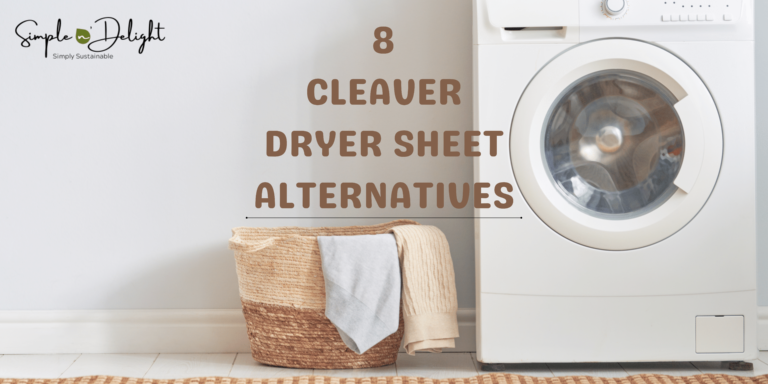




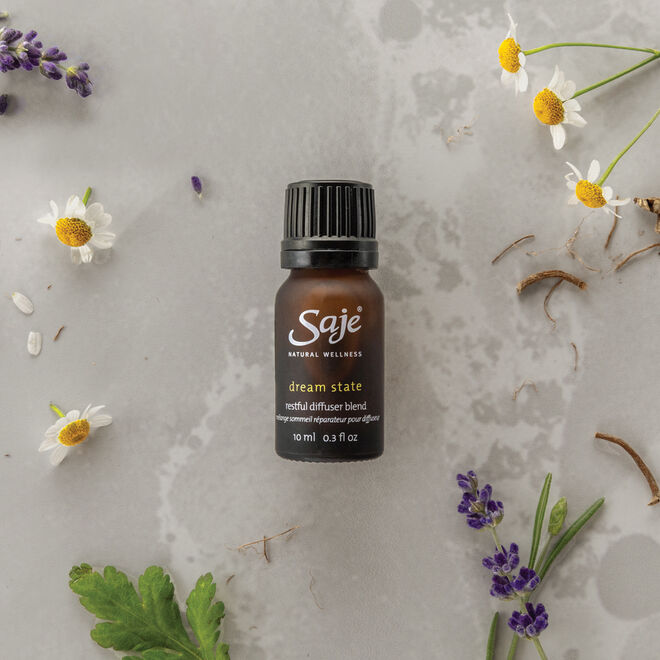
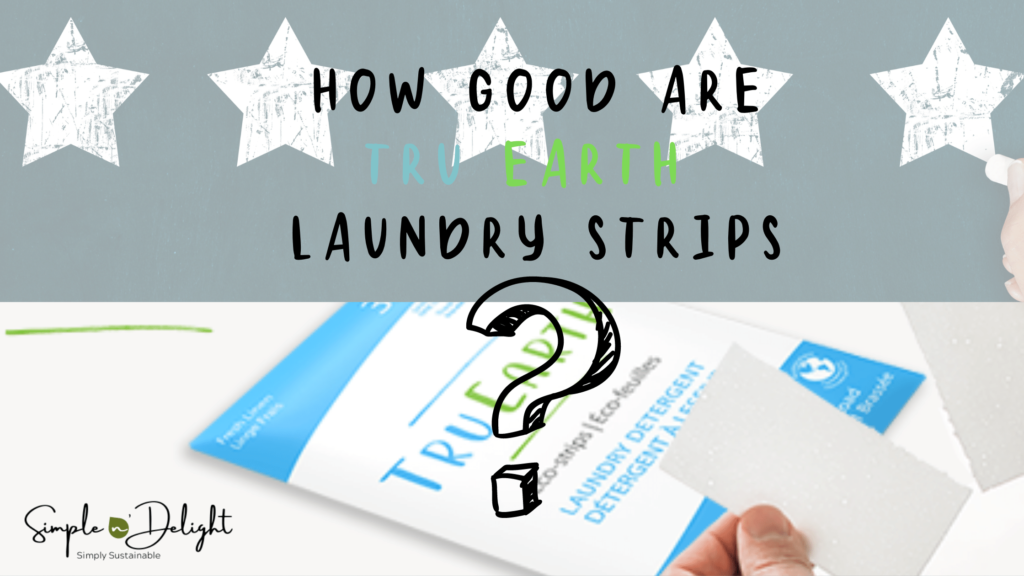


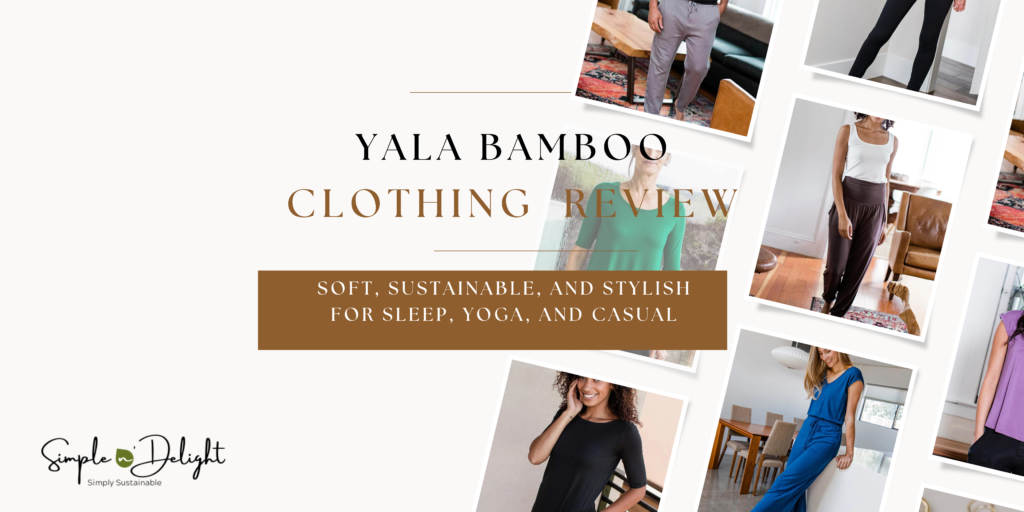


8 Responses
Number # 8 its very interesting and I never thought that vinegar can be used as a softener, very creative. I will definitely try this one out. Thanks for all the suggestions!
So informative and very well written article. We have never used dryer sheets but after reading your post we could definitely try. Thanks for sharing!
This was so informative and helpful! I try to make conscious choices for my family, but we can always learn more! Thank you for sharing!
Oooh…the vinegar works like a charm!
I stopped using dryer sheets years ago because my skin was always itchy – but I do miss the benefits of what a dryer sheet does. Glad I came across this article because the wool balls would be perfect for our family!
I really enjoy wool dryer sheets. My mom has started using them too.
I’m always trying to find dryer sheets and nontoxic laundry supplies. I didn’t know biokleen had dryer sheets! i used a lot of their products in the past. thanks for this post.
LOOOOVE this. I’ve been using wool dryer balls for years! (sunrises2sunsets.net)